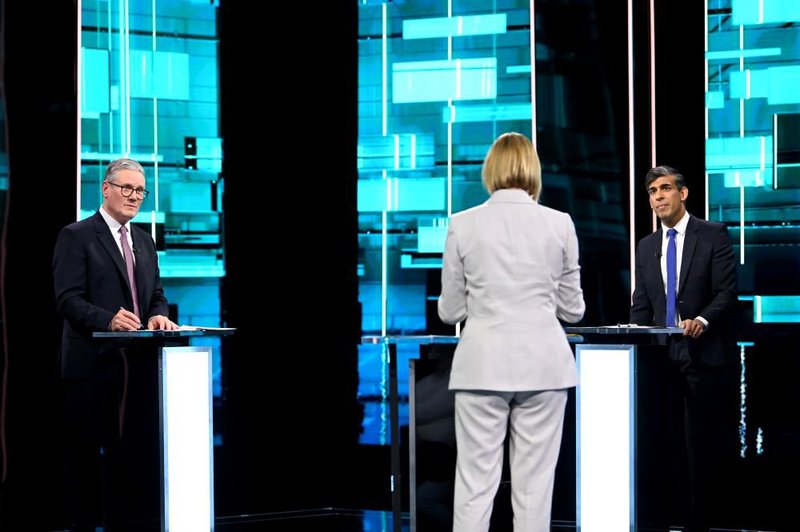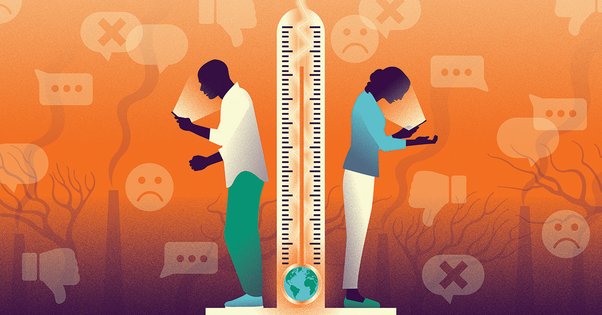Climate policy has been making headlines this election season in the UK, with parties discussing their campaign and policy strategies such as Labour making net zero a key part of their campaign plans, Reform UK on the opposite tack planning to scrap net zero, and calls from Tory MPs for the Conservatives to follow suit, as well as other parties planning their own climate commitments.
As the leaders debates kicked off this week with a showdown between Rishi Sunak and Keir Starmer, climate divisions continued to spiral online.
Even just the mention of climate change by Julie Etchingham, the presenter of this week’s election debate, in the opening of the show, sparked instant anger on social media that the climate change ‘scam’ should be a subject of political discussion.
In the debate, Sunak and Starmer clashed over their respective climate policies, with renewables, energy security and costs to households all featuring in the discussion.
These topics were echoed in posts online, with wide-ranging discussion about the proposals.
This included some frustration from online commenters that climate change would be a policy priority over problems affecting people in the UK day-to-day, like the cost of living crisis, although our own campaigning has exposed the inescapable reality that it is our broken fossil-fuelled energy system that is both killing the planet and contributing to the high cost of living through unaffordable energy bills.

But in social media discussions between viewers, beyond energy policy disagreements, there were also even more fundamental divisions coming to the fore, spanning from climate denial to climate conspiracism.
Claims made online included that climate change does not exist, that climate change is natural and that CO2 is good.
The phrase "climate catastrophe", used by an audience member asking a question to the two leaders in the TV debate, provoked particular ire in online discussions.
Some commenters argued that although climate change is real, it should not be characterised as a catastrophe. Those who took issue with a "catastrophe/emergency" framing included both smaller accounts and several journalists with hundreds of thousands of followers. Others said there was no climate crisis or catastrophe, and those who claimed there was were stupid, mad, brainwashed, or alarmists.
The woman claiming that "the world is having a climate catastrophe" was straight out of central casting. #ITVdebate
— Julia Hartley-Brewer (@JuliaHB1) June 4, 2024
PS. The world is NOT facing a climate catastrophe and both Sunak and Starmer are pushing insane policies that will cost billions and make us poorer.
#itvdebate starts with
— Bev Turner 🌸 (@beverleyturner) June 4, 2024
"There was a pandemic"
(b*ll*cks)
"There was putin invading Ukraine"
(not that simple)
"There is a climate emergency"
(not that simple).
Julie lost me at her opening......
This is why i can't watch Establishment news.
You'll have to hear some sense…
Elsewhere online, climate change was called a "hoax", a "scam", a "fraud" or a "con" – sometimes referenced together with other world events perceived to be "scams". Other people saw climate change itself as evidence of a conspiracy, with changes caused by geoengineering and chemicals being sprayed into the sky. And users discussed climate action as being part of a conspiracy, as a cover-up for crime or way to profit, or a globalist plot which wanted to destroy people’s ways of living.
Debates on TV don’t happen in a vacuum: they encourage people to continue the discussion on social media. The issues arrive when these online spaces incentivise misinformation.
Of course, these online narratives are not new: they have been present for years in climate conversations. The increasing threat, however, is that in a year when more people will go to the polls than ever before, while climate change is wreaking devastation around the world, these conspiracies are still flourishing.
Our spaces of democratic discussion are designed for profit over people: social media environments encourage and enable anger, division and conspiracism.
Without a healthy information environment, building a collective solution to the climate crisis becomes even more of a challenge. The threat of climate disinformation is not just that it spreads inaccurate information. It disrupts the possibility for political progress by undermining the basis on which citizens can enter climate policy discussions.
The winners of this election will oversee a critical juncture in the global fight against the climate crisis. The inalienable science of climate change must not be a casualty of politicians seeking votes by sowing division – and likewise social media platforms must put people and the planet before profit, and ensure they do not incentivise the type of concerning content we saw posted this week.


